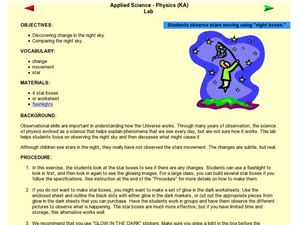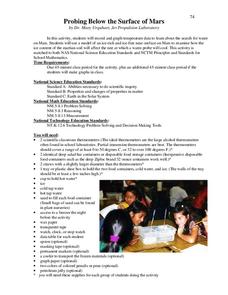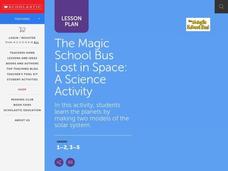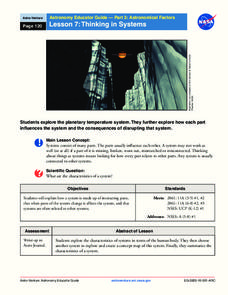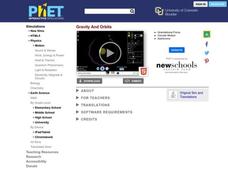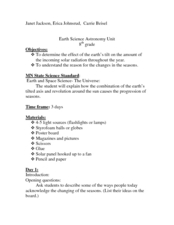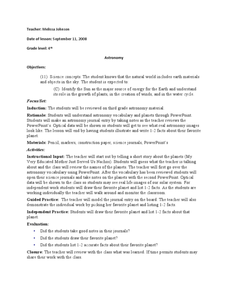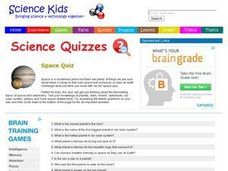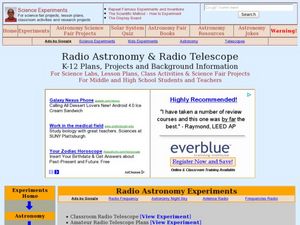NASA
Let's Investigate Mars
Take your science class on a hypothetical field trip to Mars with an engaging astronomy instructional activity. After first learning about NASA's Mars rover missions, young scientists plan their own scientific investigations of Earth's...
Curated OER
Time Line of Astronomy Events and Discoveries
Learners work in groups to present a segment of a timeline of events and discoveries in astronomy. In this astronomy lesson plan, students teach their classmates about their section of the timeline.
Curated OER
Strange New Planet
Students simulate different spacecraft missions using materials provided. In this space science instructional activity, students observe and record a planetary model's features from a distance. They relate this activity to scientists'...
Curated OER
Solar Cycle
Students explore the solar cycle through a series of experiments. In this space science lesson, students construct and evaluate solar cycle graphs. They explain how this phenomenon affects the Earth.
Curated OER
Night Sky Observation
Learners explore space science by completing an observational worksheet. In this astronomy activity, students view several worksheets in which learners identify minor changes between separate images in preparation for real star...
Curated OER
Probing Below the Surface of Mars
Learners simulate the search for water in Mars using simple apparatus. For this space science lesson, students explain how soil temperature affects the cooling of probes. They graph the data collected from the simulation.
Curated OER
Impact Craters: Holes in the Ground!
Middle schoolers simulate crater formation through a lab activity. In this space science lesson, students calculate how much energy is transferred during meteorite impact. They identify different factors affecting the size and depth of...
Curated OER
The Magic School Bus Lost in Space
Young scholars learn along with Ms. Frizzle's class. In this Magic School Bus lesson plan, students explore outer space as they visit the Sun, Mercury, Venus, and Mars in order to learn about our solar system.
Curated OER
Break the Code: Astronomy
Here is a quick puzzle-style activity for your aspiring astronomers. A code is printed at the top of the page and learners use it to fill in the blanks describing different phenomena or objects in outer space. The material does not even...
Curated OER
Our Sky Clock
Students explore space science by completing a worksheet in class. In this astronomy lesson, students discuss and identify star patterns in the night sky and relate these patterns to the approximate time they appear. Students complete an...
Curated OER
Twinkle, Twinkle, Little Star Lab
For this space science worksheet, 7th graders use the star circles given but the teacher to complete 14 short answer questions. They plot the stars on the graph.
Curated OER
Getting to Know Saturn: The Saturn System
Learners compare and contrast Earth and Saturn's planet features. In this space science lesson plan, students draw a diagram of the solar system and identify the different components. They complete a Saturn system scavenger hunt and Venn...
Curated OER
Rover Races
Students identify the challenges encountered by astronauts in operating a planetary rover. In this space science lesson plan, students create a rover using their team members. They follow a command sequence from the driver and navigate...
Curated OER
A Family of Planets-Science Puzzlers, Twisters & Teasers
For this space science worksheet, students complete 7 science puzzles, riddles, word scrambles, and teasers about the planets and solar system.
Center for Math and Science Education
Solar System Launch
Trying to understand the vastness of outer space can be quite a challenge for young scientists. Help put things in perspective with this cross-curricular activity as students work in pairs creating scaled models of the solar system,...
NASA
Astronomy Mission Module
Yes, scientists say, there is other life in our solar system! And the best place to look is on Europa, a moon of Jupiter. Here, learners mimic the techniques scientists use to gather information about objects in our solar system, write...
Center for Math and Science Education
Pocket Solar System
How in the world can something as big as the solar system possibly fit in your pocket? Complete this simple modeling activity and find out, as young scientists gain an appreciation for the incredible scale of outer space.
Star Date
Solar System Scale Model Demonstration
Explore outer space and decorate your classroom with an astronomy project. Learners create a visual model with the creation of a scaled solar system using different sized balls.
PHET
Gravity And Orbits
Have you ever wanted to turn off gravity? This simulation allows learners to do just that in addition to altering other variables. Scholars can move the sun, Earth, moon, and space station to see how distance affects gravitational pull....
Curated OER
Earth Science Astronomy Unit: Seasons on Earth
Eighth graders describe how the Earth's position causes seasonal changes. In this astronomy lesson, 8th graders explain how solar radiation varies depending on the season. They create a collage or poster on each of the Earth's four seasons.
Curated OER
Astronomy as a Career
In this astronomy as a career instructional activity, students use 2 graphs to answer 4 questions about the number of PhDs awarded, the number of PhD's awarded compared to Bachelor's degrees in astronomy and factors that might be...
Curated OER
Astronomy
Learners complete a series of activities to better understand space studies. In this space science activity, the teacher is provided with a number of activities for students to complete such as finding words that begin with the prefix...
Curated OER
Science: Space Quiz
In this science: space quiz worksheet, students answer twenty questions, not interactively, about outer space, then scroll down to find the answers.
Curated OER
Radio Astronomy and Radio Telescope
Students construct a simple radio telescope. In this astronomy lesson plan, students explain how this telescope works and what information it collects.






